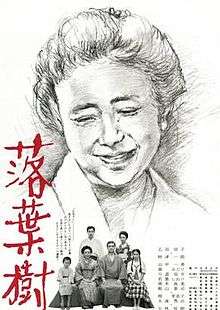Tree Without Leaves
Tree Without Leaves (落葉樹, Rakuyōju) is a 1986 autobiographical film directed and written by Kaneto Shindo. The film goes backward and forward in time to the old age and early childhood of a man. The story is based on that of Shindo's own childhood.[1]
| Tree Without Leaves | |
|---|---|
 Japanese film poster. | |
| Directed by | Kaneto Shindo |
| Produced by | Masaya Endo |
| Written by | Kaneto Shindo |
| Starring |
|
| Music by | Hikaru Hayashi |
| Cinematography | Yoshiyuki Miyake |
| Edited by | Mitsuo Kondô |
Production company | |
Release date |
|
Running time | 105 min. |
| Country | Japan |
| Language | Japanese |
The Japanese title of the film means "deciduous tree", rather than "tree without leaves".
Plot
The film is a voiced-over narrative describing the early boyhood of a narrator, who is also depicted as an old man. The narrator describes his relationship with his mother (played by Nobuko Otowa) and his father (played by Ichiro Zaitsu).
His father's financial incompetence and idleness cause disaster for the boy's family. The boy's older brother and sisters all leave home, the older brother and older sister to get married, while his mother struggles on until her death, with the father doing little except sitting idly and smoking a pipe.
The boy, now an old man, is visited by a woman (played by Meiko Kaji) at his house in the mountains. She reads his life story, which he has written as a novel, and he reminisces about his mother, whom he wants to be remembered. The woman stays the night and then leaves the next day.
The film continues with reminiscences of the oldest sister leaving to marry a Japanese-American, his older brother pleading with his father again to go and live with them, and the house being demolished piece by piece as the boy's father sits motionless. Finally, the boy's mother dies.
Cast
| Role | Actor |
|---|---|
| Old man | Keiju Kobayashi |
| Mother | Nobuko Otowa |
| Father | Ichiro Zaitsu |
| Oldest sister | Midori Sono (Takako Miki) |
| Youngest sister | Shiori Wakaba (Shiori Suwano) |
| Sakuzo | Taiji Tonoyama |
| Woman who comes to the mountain | Meiko Kaji |
| Rokko Toura |
Production
The house in the mountains where the old man lives was director Shindo's actual mountain retreat, and is the same building as in A Last Note.[2]
References
- Shindo, Kaneto (2008). Ikite iru kagiri - Watashi no Rirekisho (in Japanese). ISBN 978-4-532-16661-8.
- Shindo, Kaneto (2012). Nagase, Hiroko (ed.). 100 sai no ryugi [The Centenarian's Way] (in Japanese). PHP. ISBN 978-4-569-80434-7.